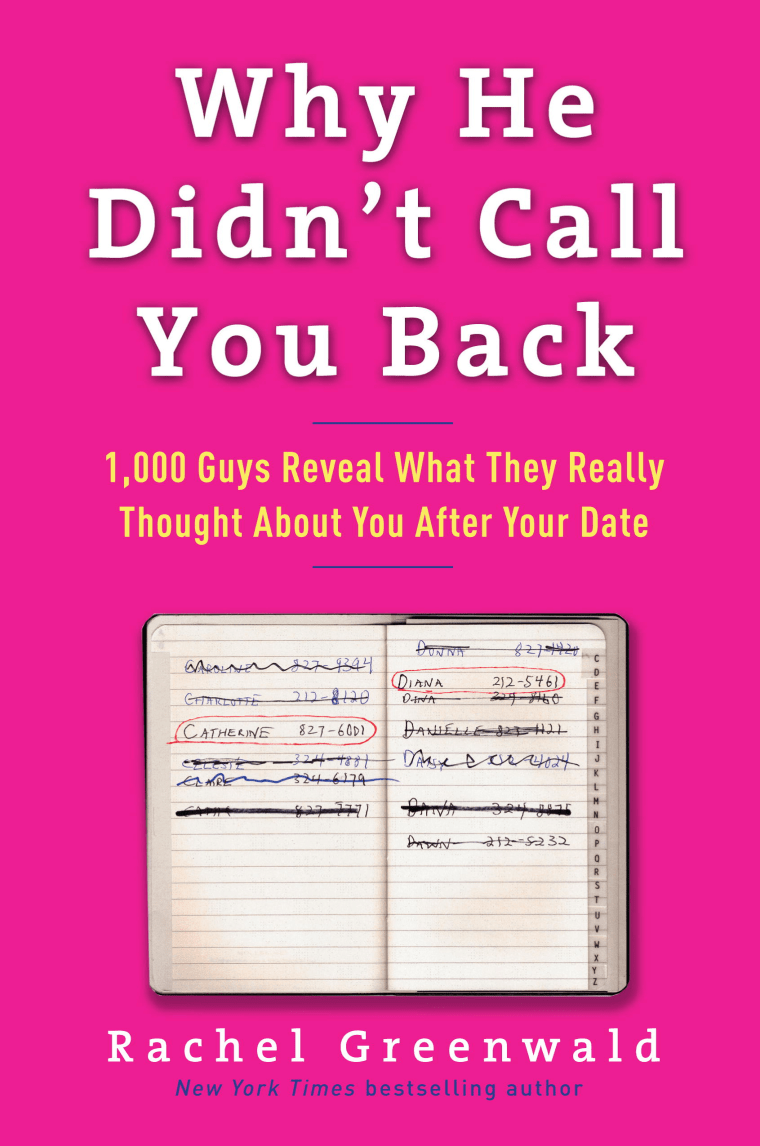What really happened when that cute guy never called you back after your date? Renowned dating coach Rachel Greenwald conducted in-depth “exit interviews” with 1,000 single men, asking them why they hadn't called back after a date or online flirtation. In her new book, “Why He Didn't Call You Back,” Greenwald shares their answers. In this excerpt, she writes about why the dating climate is so rough these days.
Chapter one: Everyone else is into you — so why not him? Why, Why, Why ...?
It’s the new riddle of the Sphinx: “Why didn’t he call me back?” You have a great date with a promising guy. You think it went well and expect to see him again ... but then poof! He vanishes inexplicably. You sit around with your girlfriends and debate why he didn’t call you back. What happened in between “I’ll pick you up at eight p.m.” and “poof ”? You speculate, you obsess, you rationalize, you justify.
You want to know why. When your friends tell you, “It’s not you, it’s him,” you want to know if they’re trying to be nice or telling you the truth.
Guess what? There is someone who does know the truth about what really happened on your date. But it’s not you. It’s not your friends. And it’s certainly not your mother. It’s the guy you went out with. Which means you’ll never know what really happened, right? Wrong. Of course, you’d never dream of asking him yourself because ... well, who would do that? How embarrassing. So I decided to ask him for you!
In fact, I asked a thousand hims. I interviewed one thousand guys to find out why you never heard from him again after the first date, or the first few dates. And I got some real answers. It turns out there are clear, consistent reasons why men don’t call women back. Sure, sometimes the issue is all his — who hasn’t gone out occasionally with a real jerk? But it turns out that many times we’re sending out signals we might not be aware of. And the good news is that most of these signals are easy to fine-tune.

Think about this. What if you learned that three out of the last four guys who didn’t call you back after a date had the same reason? And that it was something fixable? It might initially hurt your feelings, but it’s important to find out the real issue. Especially if it’s something that is not an accurate reflection of who you really are. In the early stage of dating, perception is reality. So when the right guy comes along in the future and there’s no room for error, you want to be ready.
The goal of a first date
Here’s a little multiple-choice quiz: What’s the goal of a first date?
A) To allow a man to discover the real you, or
B) To get him to want a second date with you?
The answer, in my opinion, is B. If your first instinct was to say A, stop and consider something for a moment. No one can accurately assess a person on a first date, no matter how astute they think their instincts are. People behave abnormally (either a little or a lot) on first dates because they’re either nervous, cynical, over eager, shy, keeping their guard up, having a bad day, or drinking too much. How many times have you jumped to negative conclusions about somebody new (a coworker or neighbor, for example), only to end up liking that person later? A man cannot really determine on a first date that you are warm, kind, brilliant, interesting, and great at math. What a man can determine on a first date is whether he is attracted to you and intrigued enough by you to want to know the real you. The problem is that he won’t meet the real you (and you won’t meet the real him) if he doesn’t want a second date.
Let me be very clear: the goal here is not to change who you are or to pretend to be someone you’re not. If you’re a person with friends, interests, a career, you’re obviously doing well. The point is not to change any of the qualities that make you you, but rather to keep the ball in your court. If more men call you for a second date, you increase your options and your opportunities to choose the man you prefer. If you don’t want a second date with him, that’s fine — you can politely decline when asked.
The new dating world So how easy is it to have a successful first date? Unfortunately, it’s not easy at all. During the past ten years, I’ve observed a shocking trend from my vantage point in the dating business: there are more failed first dates today than ever before. If the upsurge in the dating industry is any proof, people are going on more and more first dates. But these connections aren’t working because the number of single people is at an all-time high. It’s important to understand this current landscape, especially if you’re newly single after a long relationship.
The new dating world reflects three major challenges: the fallout from online dating, more sophisticated singles, and easier-to-obtain sex.
1) The fallout from online dating
More options
The question for most singles is no longer if they’re dating online, but how many sites they’re using. Singles typically have dating profiles on two or three sites now. And they’re open for romantic connections through their social networking sites too (e.g., Facebook, MySpace, Hi5, Bebo, even blogs). What’s important here is the sociological implications of single men (and women) increasingly believing they have infinite first-date possibilities through the Internet. If a potentially better match is only a mouse-click away, why call someone back after a good- but-not-100-percent perfect first date? Today dating reflects breadth, not depth.
Higher expectationsWith so many options, singles evaluate more critically. This is very time-consuming, so they try to “surf and sort” as quickly as possible. The initial process becomes all about elimination: screening out rather than screening in. Ultimately, they’re screening for perfection instead of potential.
Easier rejectionBecause online dates exist primarily behind a computer screen, they are less personal and therefore easier to reject. Dating is no longer about calling someone (or not) on the telephone, it’s about hitting the send and reply buttons (or not). It’s painless and non-confrontational to delete the ones you don’t want, just like spam.
2) Daters are more sophisticated
More relationships
Men and women come to the dating table today with more relationship experience. People typically begin dating at younger ages now than in past generations, and they stay single longer. The U.S. Census reports that the average age of marriage has risen from approximately 23.5 in 1980 to 26.5 in 2006. Think about what this means: if a thirty-five-year-old woman today had her first boyfriend in her early teens, she has been dating for more than twenty years. Depending on the longevity and number of her boyfriends, she could have, let’s say, twenty significant relationships or more under her belt.
Deeper relationships
Relationships are not only more numerous, but they are often deeper, because now many couples live together (either in or out of marriage). You’ve seen up close how your partner acts under stress, while he’s traveling, and when he’s hungry or irritable. Whether you’re divorced, widowed, or recently out of a long relationship, you’ve experienced former partners in much deeper ways, resulting in longer checklists for the next partner.
More relationships also mean more breakups, making it harder for people to put their trust into new people they’ve only just met — and easier to cross someone off the list when they aren’t sure.

Greater self-awareness
Intensifying the impact of more and deeper past relationships is the new “self-awareness industry.” This includes the rise and acceptance of couples therapy (both for married and unmarried couples), more people in solo therapy, the proliferation of popular self-help books, and more coverage of relationship analysis on popular TV shows. Singles show up to the first-date table with their analyzed experiences under the umbrella of “I won’t make that mistake again!”
With so much history, men and women are predisposed to quickly project their past onto somebody new and feel confident those quick judgments are accurate. What’s the result? The average single person is now more sophisticated and confident than ever about what they are and aren’t looking for ... making the first date an unprecedented minefield.
3) The sex factor
Today, sex is easier to obtain without committed dating (via “hookups” or “friends with benefits”), and couples are now more sexually active early in courtship. Consequently, there is not the same pressure for single people to go on multiple dates to get to “the sex part.” Simply put, there is no longer the same urgency or physical incentive to pursue a commitment to one person. Increasingly, everyone is window shopping but few are buying
Reprinted from "Why He Didn't Call You Back" by Rachel Greenwald. Copyright © 2009. Published by Crown Publishers, a division of Random House, Inc.